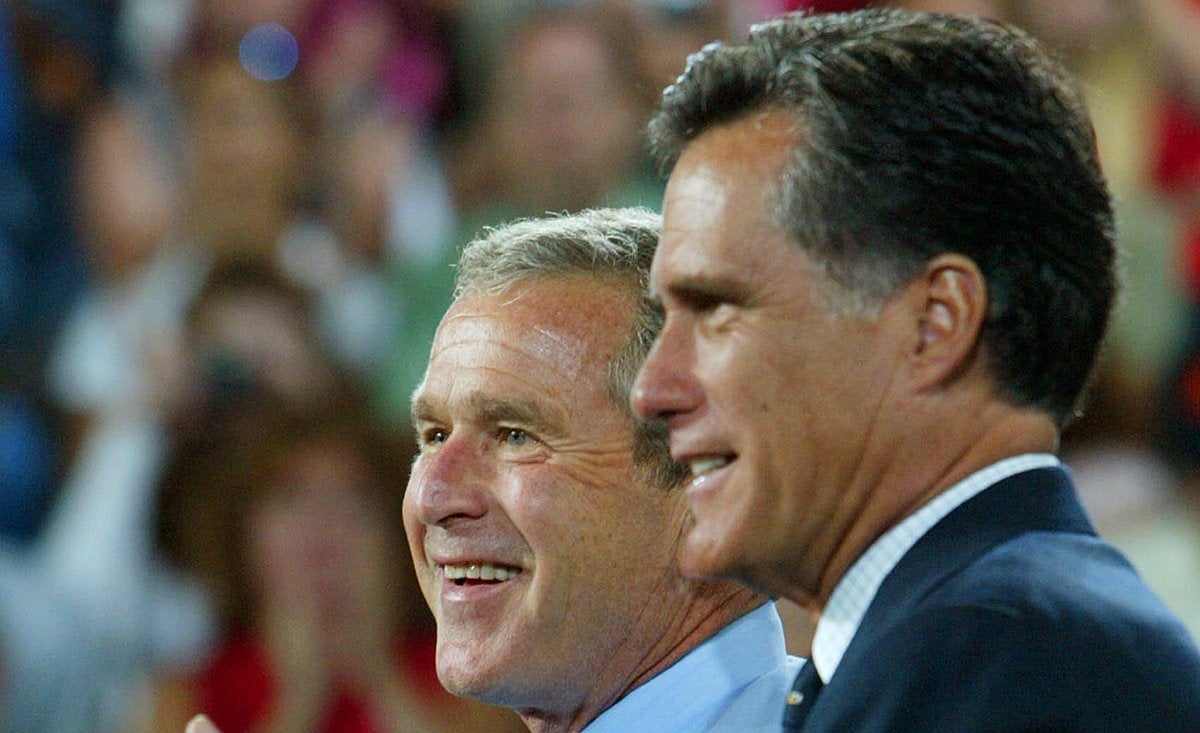Mitt Romney is more similar to George W. Bush than he thinks
For eight long years, George W. Bush, was the standard bearer of the GOP. In conservative media, you will rarely encounter affirmative defenses of Bush, unless someone who worked in the Bush White House happens to be a guest or a contributor. While you no longer hear affirmative defenses of Bush’s record from mainstream conservatives, you never encounter denunciations either. Occasionally, Bush’s massive budget deficits (improperly attributed to “too much spending) will be criticized, but on all of the most important questions, the invasion of Iraq, the “freedom agenda,” the tax cuts, the war on terror, conservatives still stand by their man with remarkable loyalty.

For eight long years, George W. Bush, was the standard bearer of the GOP. In conservative media, you will rarely encounter affirmative defenses of Bush, unless someone who worked in the Bush White House happens to be a guest or a contributor. While you no longer hear affirmative defenses of Bush’s record from mainstream conservatives, you never encounter denunciations either. Occasionally, Bush’s massive budget deficits (improperly attributed to “too much spending) will be criticized, but on all of the most important questions, the invasion of Iraq, the “freedom agenda,” the tax cuts, the war on terror, conservatives still stand by their man with remarkable loyalty.
This is why Mitt Romney’s answer to the question from the 2nd presidential debate about his differences from George W. Bush was so insufficient. For a campaign that constantly preaches “timeless principles” and “conservative values” neither Romney nor his running mate Paul Ryan have any record of opposing any of the Bush policies they now bemoan. Ryan, of course, was in congress for the entirety of Bush’s time in office, and was a loyal and enthusiastic supporter of the Bush agenda: his budget hawkishness was conveniently acquired after Bush left office.
For a man who has wholeheartedly adopted conservatism’s embrace of “absolute values” and disdain of “relativism,” Romney’s answer about Bush was remarkably relativistic. As Romney said, he and Bush “are different people and these are different times.” It’s no one’s fault, you see: Bush did what he could when he could and it’s just so very unfair to judge him with the benefit of hindsight. Romney’s language of “different strokes for different folks,” is, to put it mildly, not the sort of language that one typically associates with conservative Republicans.
The first thing that Romney mentioned in his explanation of how he was different from Bush was the development of new drilling technology: “we can now, by virtue of new technology, actually get all the energy we need in North America without having to go to the—the Arabs or the Venezuelans or anyone else. That wasn’t true in his time.” This is not exactly a compelling response, it’s sort of like saying that the biggest difference between Bush and Clinton was the development of the iPhone.
The rest of Romney’s answer was even stranger. Romney seemed to accuse Bush of being soft on China, indifferent to Latin America, and an opponent of small business. Because of his unpopularity, Bush has been subject to a large number of critiques. I have never before, though, seen the 43rd president of the United States portrayed as China coddling, Latin America disdaining, and small business hating. If we go back all the way to the 2000 presidential campaign, we can remember that Bush described China as a “strategic competitor,” that he declared that he would look to South America “not as an afterthought, but as a fundamental commitment,” and that he promised to cut taxes on small businesses. So, contra Romney, Bush was hawkish on China, supportive of South America, and receptive to the concerns of small business.
That Romney and Bush are using almost identical language to describe China, South America, and small business (among other things: a more detailed treatment of their rhetorical similarities would run to novel length) is not in the least bit surprising. In case we’ve forgotten, Bush and Romney are Republican politicians of the same generation (Bush is 66, Romney is 65), appealing to the same base, and supported by the same powerful business interests. Given their similarities, it would be surprising if Bush and Romney didn’t sound the same.
Romney’s attempt to respectfully distance himself from Bush will probably work. Given the frenetic pace of modern elections and the immense pressure of 24 hour media cycles, re-fighting issues from the Bush administration will likely seem either churlish or crazy. Obama has an extremely tall order if he wants to convince the public that “Romney = Bush.” As even a perfunctory examination of Bush’s campaign rhetoric suggests, Romney’s “new” proposals really are substantively similar to Bush’s. And if he look at Bush’s record in office, cutting taxes, eliminating regulations, “supporting small business,” and “getting tough with China” weren’t extremely beneficial to most Americans. One does not need to be a partisan Democrat to see that the GOP really hasn’t changed much since Bush’s time in office.